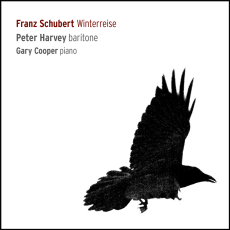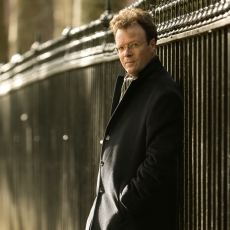Peter Harvey - Winterreise - Audio Video Club of Atlanta
To say that Franz Schubert's Winterreise (Winter Journey) is the apex of the art of the song interpreter is to state no more than the truth. How it should come to be thus with a poet like Wilhelm Müller to inspire him is not as apparent upon first reading. Clearly, Müller was no Goethe, Eichendorff, or Rilke, but his cycle of poems describing the conflicting emotions of a young man undertaking a snowbound journey on foot, hurt, embittered, and disappointed in love and experiencing an increasing alienation from the society of his fellow men, proved to be just the stimulus the composer needed to create a towering masterpiece of the lieder (art song) genre.
Not that there weren't inherent problems. Müller's hero is undeniably overwhelmed with such a mountain of self-pity that all occasions seem to inform against him, down to the very crows whom he accuses of adding to the general derision by throwing snowballs at him (Rückblick), one of whose species even follows him in the hope of feeding on his carcass when he drops from world-weary exhaustion (Die Krahe)! Adding to the problem was the fact that Müller's verses tend to be doggedly regular, four lines to the stanza, eight syllables to the line, reinforcing the impression of dreariness. Certainly, Schubert had to do something to avoid getting bogged down in the maudlin, and he did. Rising emotion within the stanza, especially in the first half of the 24-poem cycle when the hero is overwhelmed by his sense of injustice and betrayal or beguiled by nostalgia-tinged memories and illusory dreams of a fondly imagined lost happiness (as in Frühlingstraum, Dream of Spring), are contrasted by a return to the present situation as the hero steadily plods his snowbound path with difficulty.
For this Winter's Journey one obviously needs the right interpreter, and we find him in English baritone Peter Harvey. This singer clearly has not simply learned Winterreise phonetically, but understands the nuances of the German language to an unusual degree, enabling him to place the right emphasis in each line with unerring accuracy and emotional impact. That is particularly true in the instances when Schubert repeats a line, or sometimes an entire stanza, in order to intensify the impact of particular verse, as he does in Auf dem Flusse (At the River). Here the wanderer likens his situation to the frozen river (translated): "My heart, in this brook / Do you not know recognize your own likeness? / Does not a similar torrent rage / Beneath its surface?" Harvey alters the emphasis in the repeat, indicating the first discernible stage in the wanderer's increasing acceptance of a situation against which he has previously railed.
Schubert described Winterreise as "a cycle of terrifying songs," which affected him more than anything else he had written. What is terifying, of course, is the inner state of the hero, driven by anguish, alienation, and a keen sense of persecution to moments when he may be contemplating suicide. That seems to be the subtle message of as innocent sounding and familiar a song as Der Lindenbaum (The Linden Tree), with its repeated line "Come here, my friend, / Here you shall find peace."
Schubert continually uses all the possibilities of music to conjure up visual and sensual images: the winter wind blowing a grating weathercock to and fro (symbol of inconstancy), the rising emotions of the hero as he hears the sound of the posthorn (Will the mail bring him the long-awaited letter from his beloved?), the will-o'-the-wisp that threatens to distract him from his path, the cawing of crows, the barking dogs who strain at their chains at his approach. In the instability of the musical setting in Rückblick (Backward Glance), we feel his ambivalence at leaving a place that was once so full of promise for him.
Harvey's extreme sensitivity to sound and nuance is paralleled by his recital partner, Gary Cooper. That's as it must be since Winterreise depends as much on the pianist as it does the singer for its successful realization. Playing on a copy of an early 19th century fortepiano enables Cooper to capture Schubert's sound world with the greatest fidelity. In the final song, Der Leiermann (The Hurdy Gurdy Man) sound and sense have become identical, just as the hero, whose life's journey has come to represent the path of the creative artist, realizes his kinship with the aged street musician, shunned by the heedless multitudes: "No one wants to listen, / No one pays him any heed, / And the dogs snarl / Around the old man" (How well the sound of the word knurren, snarling, fits its sense!) Both vocal and piano lines converge to capture the mood of desolation of this last song, in its eerie depiction of the hero's, and Schubert's, "double" as an elderly man playing an unheard tune on a dilapidated barrel organ with a missing key. "Our focus throughout this recording," says Harvey in his program notes, "has been to convey the spirit of a real performance, and to tell the story with honesty and immediacy." In that, they have succeeded admirably.

